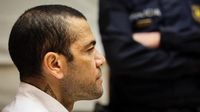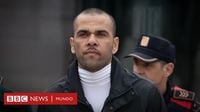The High Court of Justice of Catalonia (TSJC) has unanimously overturned the conviction of footballer Dani Alves for sexually assaulting a woman in a Barcelona nightclub. The court has accepted his defense's appeal against the ruling by the Barcelona High Court, which sentenced him to four and a half years in prison. According to the judges who overturned the conviction, there is insufficient evidence to "exceed the standards required by the presumption of innocence." This Friday's ruling, which can be appealed, means the footballer's acquittal.
The four judges of the appeals section of the TSJC criticized the Barcelona Court for having justified the sentence with reasoning that contains "inaccuracies, inconsistencies, and contradictions." In the same ruling, the TSJC also rejected the appeals of the Prosecutor's Office and the private prosecution, which represents the complainant, requesting an increase in the sentence to nine and twelve years, respectively. The TSJC judges justified their decision on the alleged "lack of reliability of the complainant's witness." They stated that the young woman's version of events does not coincide with some moments recorded by the security cameras, which the judges who convicted Alves already consulted.
The judges of the TSJC also criticized the Barcelona Court for having accepted the young woman's explanation of the sexual assault in a nightclub restroom as valid, "avoiding comparing it with other evidence," such as a DNA sample or comparing fingerprints. "The lower court's ruling presents very significant appraisal deficits," the TSJC insisted. The judges criticized the authors of the first ruling for basing it on a subjective belief about what happened inside the bathroom, limited solely to the fact that vaginal penetration was non-consensual, as the complainant maintains.
Inés Guardiola, Alves's lawyer, celebrated the footballer's acquittal, stating, "Finally, justice has been done." She expressed her satisfaction with the ruling, emphasizing that it confirmed Alves's innocence. The acquittal means that Alves, who had been in pre-trial detention for fourteen months, can now leave Spain and will no longer have to comply with the precautionary measures imposed upon him.
In the original ruling, the Barcelona Court had established that Alves took the 23-year-old woman to a bathroom in the VIP sector of the Sutton nightclub, where he allegedly forced her to have sexual relations without consent and violently. However, the TSJC found that the original ruling presented "vacancies, inaccuracies, inconsistencies, and contradictions about the facts." The justice system stated that the evidence collected in the trial and that supported the conviction does not allow "to exceed the standards required by the presumption of innocence."
One of the main inconsistencies highlighted by the TSJC relates to an alleged fellatio that the victim denied having practiced before being penetrated by Alves. The court noted that the initial ruling presented contradictions regarding the sequence of events and the injuries sustained by the complainant. The TSJC emphasized that the divergence between the complainant's account and the security camera footage severely compromised the reliability of her testimony.
The TSJC's ruling has sparked significant media attention, with reactions pouring in from various quarters. Many have expressed concerns about the implications of the ruling for future victims of sexual assault. Journalist Pilar Gómez remarked, "It is a terrible news because it builds a reality of 'you won't be believed' and 'don't report.' Victims should continue to come forward."
Officials have also weighed in on the ruling. María Jesús Montero, the deputy prime minister, expressed her solidarity with all victims of abuse, stating, "I will be prudent because I have not read the ruling, but I extend my solidarity to all victims of abuse who sometimes face difficult situations."
The case has raised questions about the reliability of witness testimony and the standards of evidence required in sexual assault cases. The TSJC's decision to overturn the conviction has been seen by some as a significant moment in the ongoing discourse around sexual violence and the justice system's treatment of such cases.
As of now, Alves has not made any public statements regarding the ruling, and his legal team is considering the next steps. The Prosecutor's Office and the private prosecution have expressed their disappointment with the ruling and are contemplating their options, including the possibility of appealing to the Supreme Court.
In summary, the TSJC's ruling has not only acquitted Dani Alves but also highlighted significant flaws in the initial conviction, raising broader questions about the treatment of sexual assault cases in the judicial system. This case will likely continue to resonate in discussions about justice for victims and the presumption of innocence for the accused.










